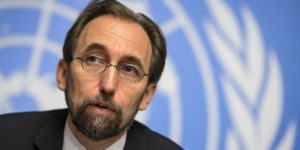DAWN salutes the candor and clarity of the Human Rights Commissioner. We share a fragment of his global update of human rights concerns, presented at the 37th session of the HRC:
High Commissioner’s global update of human rights concerns
37th session of the Human Rights Council
7 March 2018
Distinguished President,
Excellencies,
Colleagues, Friends,
A few days ago, we celebrated the centenary year of Nelson Mandela’s birth. We spoke of his example; his fortitude, his suffering and compassion, while recalling also the declaration that he and my predecessor Mary Robinson signed in 2000 on diversity and tolerance.
And it was right for us – not just to have remembered Mandela’s greatness, but to have, almost unconsciously, contrasted it with all the narrow politicians who continue to proliferate across the face of the world. Authoritarian in nature, many of them are wily political in-fighters, but most are of thin mind and faint humanity – prone to fan division and intolerance and just for the sake of securing their political ambition. While some do this more openly than others, all are well aware what they practise comes at the expense of vulnerable humans.
To them I say: you may seize power, or stubbornly hold onto it, by playing on and stoking the fears of your followers. You may congratulate yourselves for this and you may think yourself so clever for it. But we know all you’ve done is copy the behaviour of previous generations of once strong, but ultimately catastrophic, leaders and politicians. Yours will in the end become a mouse-like global reputation, never the fine example of the leader you think you are – and never even close to a Mandela. To deserve global respect, you must begin to follow his example – committing to the spirit and letter of the Universal Declaration of Human Rights.
What makes it so difficult for us to understand this Declaration, its universality and how to view our fundamental sameness relative to our differences? We are all humans. We are almost identical genetically – on average, in DNA sequence, each human is 99.9% the same as any other human. We have the same organs, we all have to breathe, eat, sleep and, to survive as a species, reproduce. We have feelings, we love, we think, we have hopes and, if fortunate, we will grow old before expiring. This is the core of what it is to be a human being.
Everything that’s bolted on – that is colour, race, ethnicity, gender and all the rest – comes only afterthe acquisition by each of us of our rights as human beings. And this is what the adoption of the Universal Declaration formalized seventy years ago. The present-day hatred, and its corresponding rising uncertainties, seem to come from humans who view the relationship between the core and the bolted–on characteristics in reverse. In their view, the differences decide everything. But this approach, if each of us were to adopt it, and act upon it, would be an open invitation to human self-annihilation. It cannot be – it simply cannot be!
(…)

It takes real courage to stand up for women’s rights – including sexual and reproductive rights – in many parts of the world, in this 21st century. In countries across every region, women are suffering from increasingly regressive legislation, threats against activists and a renewed obsession with controlling their decisions. In the past year, a new movement for justice has risen up to combat the abuse and sexual exploitation of women: the MeToo movement, an expression of solidarity and a force for dignity that is much needed, including in the wealthiest societies. Wherever I have travelled I have been privileged to meet women who defy restrictions on their freedom. These resilient and powerful women teach us – have, indeed, taught me – that every individual can help to reshape society, and the world.
I don’t much like the phrase “speaking truth to power” because in reality it is not rank which confers moral value: the power is in truth itself.
I commend the many civil society movements fighting for decency and respect for human rights, including the rights of indigenous people facing unprincipled and lawless business activities; for LGBTI people whose Governments do not ensure their equal rights or protect them adequately from violent assault; and the rights of Afrodescendants, Roma and other ethnic, religious or caste-based communities which frequently endure discrimination. In this 70th year of the Universal Declaration of Human Rights, they are standing up for the fundamental principles which will bring a better future to all our children. I am deeply grateful for the surge of hope they bring.
I thank you Mr President.
Read the full text here: http://www.ohchr.org/EN/NewsEvents/Pages/DisplayNews.aspx?NewsID=22772&LangID=E
